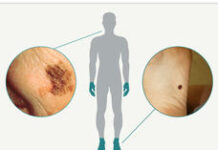
Kristine Chadwick was married to her husband, Matthew Chadwick, for 7 years. He passed away from a brain tumor in 2013. Kris was diagnosed with metastatic breast cancer in 2018. Following treatment, she is now living in London and is back at work full-time, living well with cancer, and blogging about it at Cancer Club. You can follow her on Twitter.
In a way, I was lucky. I married my husband knowing he had cancer. I didn’t have to deal with the sudden emotional impact and upheaval an initial cancer diagnosis has on people’s lives. When I met Matt in 2002, his cancer was in remission, and it seemed like the world was his oyster. Sadly, around the end of 2010, his health started to deteriorate. By 2012, he was no longer able to work, so the news that his brain tumor was growing again didn’t come as a complete shock. Though life did undergo some serious readjusting.
The transition from wife to caregiver was one I struggled with as I felt the dynamic in our relationship change. As a partner, I felt helpless. There’s nothing harder for me than watching a loved one suffer and feeling incapable of making it better. It was also incredibly difficult to accept that my relationship would never be the same again. As a caregiver, my time was taken up with trying to balance caring for a strong-willed adult, managing hospital appointments, and trying to maintain a semblance of normalcy. Caring for someone with cancer is emotionally and physically exhausting. It takes incredible strength, and it’s difficult to remember to take care of yourself, too.
Then, in 2018, I was diagnosed with metastatic breast cancer. So, I have been both a caregiver and a patient. And for me, it was far easier being the patient than it was being the caregiver. As a caregiver, you take on your loved one’s emotions and worry as well as your own. While I don’t think I mastered taking time for myself as a caregiver, I can’t emphasize it enough to friends and family who I see going through the same process.
While I was caring for Matt, I used work as an escape. It used to wrack me with guilt to think Matt would feel abandoned and lonely while I was at work. However, having recently been inducted into the cancer club, I now understand that it’s actually nice to have space and time to yourself. Being alone is different from being lonely. You don’t feel lonely if your friends and family form a cocoon of support around you. Time alone also gives you time to sleep, which is incredibly healing and heavenly when it’s a guilt-free afternoon nap.
Another thing that caused me extreme guilt when I was a caregiver was, in order to try and protect myself from the inevitable Matt-sized hole that would be left after his death, I started the grieving process while I was still caring for him. I could feel myself detaching from him and hating myself for doing so. The realities of coping with life as it was and imagining what it would eventually become caused me many sleepless nights. Thankfully, going to counseling and having someone neutral to talk things through with really helped and was a life-saver for me.
When I was caring for Matt, I wanted to make his life as simple, painless, and enjoyable as possible. I would see Matt struggle to button his shirt, put the dog’s leash on, or make a cup of tea, so I’d jump in and do it for him. However, little did I realize that by helping Matt, I was taking away his independence. I totally get Matt’s frustration with me now. Sometimes, the more you “help,” the more the person may feel like a patient or victim rather than someone who happens to have cancer.
When I experienced cancer myself, I realized that along with the loss of independence came the feeling of a loss of control. You wish you knew how much time you had. You wish you could predict when the good days would be to make sure you made the most of them. On the rollercoaster ride that is a cancer diagnosis, you can’t control the cancer or when your treatments are, but you like to think you can control what you do outside of the hospital.
Matt and I both got through our cancer treatments by planning events and holidays, so we had something to aim for. While it helped having something to look forward to, it was also frustrating because we never knew whether we’d be able to take part in the event until the day came. Only then would you know how you were feeling. For me, the sense of disappointment and missing out, along with the financial frustrations of not being able to take part in something I’d paid for, was more extreme when I was a caregiver than when I was the person with cancer. When I was the person with cancer, I was more than happy to rest and sleep. As the caregiver, however, the event or holiday signified a break from my routine, which now wasn’t going to happen. What helped me the most — apart from having a good cry — was to surround myself with friends and family who understood this and didn’t make me feel guilty for bailing or changing plans at the last minute.
Caregiving is a difficult job, and after living through my own cancer diagnosis, I realize how important it is for caregivers to take care of themselves. If you burn out, you’re no good to the person you’re caring for. So take a lesson from my experience as a caregiver and as a person with cancer: take time to tend to yourself.






